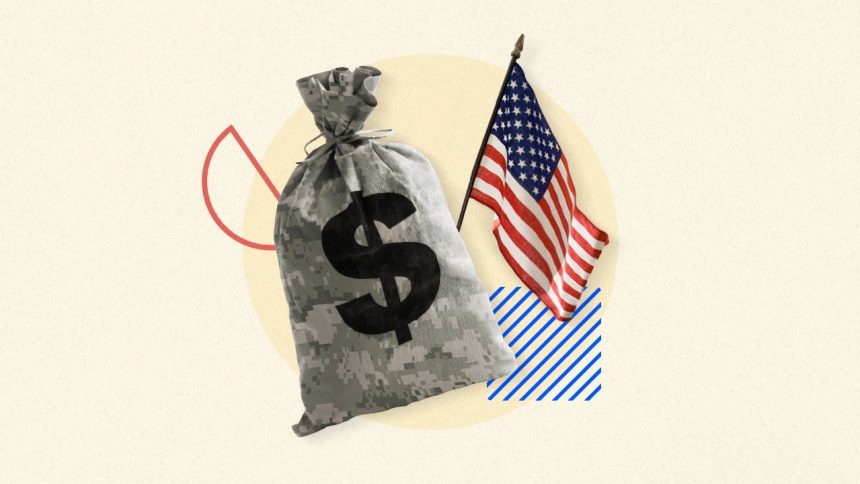Key takeaways
- VA loans offer many benefits such as no down payment/mortgage insurance, easier qualifications and lower interest rates.
- However, they also have drawbacks such as a required funding fee, property restrictions and potentially less equity to start.
- Alternatives to VA loans include conventional loans, FHA loans and USDA loans.
If you’re an eligible active-duty military member, veteran or surviving spouse, you can use a VA loan — guaranteed by the U.S. Department of Veterans Affairs (VA) — to buy a new property or refinance an existing mortgage. There are plenty of benefits of a VA home loan to consider. But drawbacks exist too.
Pros and cons of a VA loan
VA home loans can make home ownership more accessible, as they are more flexible and offer 100 percent financing and other enticing perks.
Pros
- No down payment required
- No mortgage insurance
- Lower interest rates and fees
- Easier qualifications
- Convenient refinancing options
- Assumable for veterans and civilians
Cons
- Funding fee required
- Property restrictions
- Less equity to start
Benefits of a VA loan
Here are the major advantages of a VA loan.
No down payment required
While many conventional mortgages require a down payment of at least 20 percent of the purchase price, VA loans allow eligible borrowers to become homeowners without contributing a penny upfront. That makes a big difference: Thirty percent of aspiring American homeowners believe they’ll need five or more years to save up for a down payment, and 10 percent believe they’ll need a decade or more, according to Bankrate’s recent Down Payment Survey.
No mortgage insurance
There are mortgages that require only a small down payment. But it’ll cost you: FHA loans charge mortgage insurance — both an upfront premium and an annual premium throughout the loan term. You’ll also pay private mortgage insurance (PMI) on a conventional mortgage if your down payment is less than 20 percent. But VA loans not only let you off the down payment hook, they also don’t charge any insurance at all.
Lower interest rates and fees
Lenders tend to charge lower rates for VA loans than they do on conventional loans, which means you can save a lot of money on interest in the long run, especially over a 30-year loan. VA home loan closing costs might be less than those for other loans, as well, since the VA limits the origination fee a lender can charge to no more than 1 percent of the mortgage.
Easier qualifications
The VA doesn’t set a credit score minimum for borrowers. Admittedly, some VA lenders might: generally, around 620, the same as a conventional loan — though many may allow for lower scores. Along with this flexibility, if you’ve encountered a financial challenge — you declared bankruptcy or you sold your home in a short sale, for example — the typical waiting period after a foreclosure is just two years with a VA loan. Compare that to three years with an FHA loan and up to seven years for a conventional mortgage.
Convenient refinancing options
A VA cash-out refinance option allows qualified veterans to borrow up to 100 percent of their home’s value in cash at closing, though some lenders may limit the amount to 90 percent. Either way, that’s more than many refis, which limit you to 80 percent. If you just want a straight loan swap (no cash), you could opt for an Interest Rate Reduction Refinance Loan (IRRRL). It doesn’t require a home appraisal (unlike most refis). Plus, the funding fee on a VA IRRRL is relatively small: just 0.5 percent of the loan amount.
Assumable for veterans and civilians
VA loans are assumable, meaning that if you’re selling the home, your buyer can take over the mortgage instead of obtaining one of their own, even if they’re not a veteran. VA loan assumptions are especially beneficial when interest rates are rising. While loan assumptions require extra steps — the lender must approve, and the seller has to keep their full VA loan entitlement (which impacts future home purchases), they can be an excellent perk for a buyer.
Disadvantages of a VA loan
While VA loans offer many benefits, there are also drawbacks to consider.
Funding fee required
While you won’t pay for mortgage insurance with a VA loan, you will pay a funding fee at closing (although this fee can be financed into your loan, increasing the total amount you owe). If you’re taking out your first VA loan and putting down less than 5 percent, the funding fee equates to 2.15 percent of the loan amount. If you do plan to put money down or have obtained a VA loan in the past, the fee can range from 1.25 percent (for first-time or repeat borrowers putting at least 10 percent down) to 3.3 percent (for repeat borrowers with less than 5 percent down).
Not all borrowers are required to pay the funding fee. For example, if you receive compensation for service-connected disabilities or are a veteran’s surviving spouse, you might be exempt.
Property restrictions
VA loans limit the type of property you can buy and how you can use it. You can only buy a primary residence with a VA loan — no investment or rental properties unless you intend to live in one of the units. Manufactured homes are also subject to more scrutiny, including a structural engineering examination.
Less equity to start
The major upside of a VA loan is the ability to get a mortgage with no money down. However, that can be a downside too. Because you haven’t put any cash into the home to begin with, it’ll take longer to build up equity (your outright ownership stake). Home equity is an important asset, one of the key benefits of homeownership.
If property values fall, you could end up underwater on your loan, owing more on the mortgage than what your home’s worth. This can make it much harder to sell your home or refinance to a new mortgage.
Is a VA loan the best option for you?
A VA loan offers special benefits that other financing does not. For many borrowers, the math works. However, even if you’re eligible, there are times when a VA loan might not be your best choice.
Here are some questions to ponder when deciding if a VA loan is the best ideal:
- Do you want to reap big profits from a home sale? “If you are an eligible borrower who currently owns a home and wants to sell to yield a large down payment — 20 percent or more — to put toward your next home purchase, a VA loan may not make sense,” says Rob Killinger, senior loan officer at Movement Mortgage in Massachusetts. “If you were to use a VA loan in this scenario, you may be required to pay the VA funding fee, whereas a conventional loan program would not require such a fee.”
- Are you thinking of something other than a single-family home? “For instance, a qualified borrower could purchase a two- to four-unit property with a zero-down VA loan that they plan to live in,” says Killinger. “In comparison, a conventional loan requires a minimum 15 percent down on a multi-unit property.”
- Does VA loan financing turn off local sellers? Depending on your market and the individual seller, you might encounter some resistance. That’s because there are some myths about VA loans — that the paperwork can create closing delays or that the appraisal process can derail deals, for example. It can be helpful to work with a real estate agent who knows how to educate the seller’s agent on VA loans, debunk those myths and show that your offer is just as strong — if not stronger — than the competition’s.
- Are you planning to relocate within two years? If so, it might not be worth paying the funding fee to get a VA loan.
Alternatives to VA loans
If you don’t think a VA loan is right for you, here are other alternatives:
- Conventional loan – There is no funding fee on a conventional loan, and you can use it to purchase primary homes, investment properties and second homes. You can expect a higher interest rate, and you’ll also need to make a down payment and pay mortgage insurance if it’s less than 20 percent.
- FHA loan – An FHA loan is also insured by the government but requires you to pay an upfront mortgage insurance premium and annual mortgage insurance premium. As a result, the loan’s APR might also be higher, but qualifying could be easier especially if your credit needs work.
- USDA loan – As with a VA loan, a USDA loan doesn’t require a down payment, but it’s only for borrowers in designated rural areas. USDA loans also come with income restrictions, and the property must be a single-family home.
Read the full article here
















